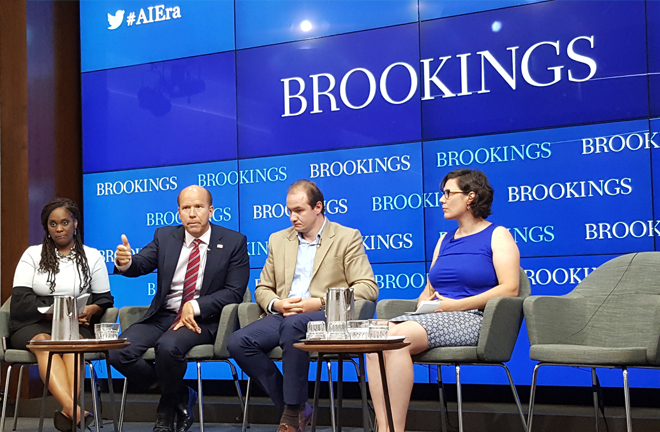Artificial Intelligence could pose security challenges, experts warn

On June 12, a forum titled “The dawn of a new era: Opportunities and challenges of artificial intelligence,” as part of the ninth annual A. Alfred Taubman Forum on Public Policy, was held by the Brookings Institution in Washington, D.C.(WANG YOURAN/CSST)
WASHINGTON—On June 12, the US think tank the Brookings Institution hosted the forum “The dawn of a new era: Opportunities and challenges of artificial intelligence,” as part of the ninth annual A. Alfred Taubman Forum on Public Policy. Experts from the US government, business and academia discussed the promise and risks posed by the advancement of AI and how to benefit from AI without incurring the downside.
Scott Tousley, deputy director of the Cyber Security Division for the Homeland Security Advanced Research Projects Agency at the Department of Homeland Security Science and Technology Directorate, said that it’s very obvious that AI will have huge impacts in multiple different areas of national security. Many cases in the past decade have shown that AI can promote the development of both offensive and defensive cyber techniques. AI is a double-edged sword, just like many other new technologies. AI may be one of the most significant breakthrough areas in a globalized world where the US, South Korea, Russia, China and other countries are heavily investing in research on AI and AI-related policy and legal issues. All these countries are experimenting with AI in not only a technical way but also a social way, Tousley said.
“We can’t overlook the security challenges AI brings to the real world, because AI will introduce entirely new forms of vulnerability. For instance, artificial neural networks are widely applied to automated driving systems, especially in image recognition, but an innocuous neural network can become a ‘killer’ when it’s attacked by adversarial examples,” said Susan Hennessey, a research fellow from Governance Studies at the Brookings Institution.
Is it too early to establish a legal and policy framework for AI? US Congressman John Delaney of Maryland said that one of the problems the US government has had is that it has not been good at managing change. Changes driven by the private sector have happened, technological innovation has obviously been an extraordinary blessing in all of our lives, but it has also created many challenges for specific individuals, our education system and job market. The job of policymakers is to look at how the world is changing, and then update the basic institutions in society in order to adapt to that change in a smart way. It’s time to start putting in place the legal and policy framework to make sure AI continues to be a blessing but unfolds in a way that makes society more just, Delaney said.
Nicolas Miailhe, a senior visiting research fellow with the Program on Science, Technology and Society at the Harvard Kennedy School of Government, said: “It’s never too early to start thinking and working on the governance framework of the AI revolution. Many people think that AI is a critical part of the Fourth Industrial Revolution that is more global and more interconnected than the previous revolutions, which requires shared global governance. AI algorithms rely on massive data; machines feed off data to learn and improve themselves. As a result, countries having advanced AI capabilities will compete fiercely for big data markets worldwide.”
In the eyes of Julia Powles, a research fellow at NYU’s Information Law Institute, AI, like other new technologies, needs to be governed and regulated. But there are shifts in power in the field of AI where huge capital and new entrants are pouring in, major technology companies are in many ways more powerful than the government, and governance is more difficult. The public interest sector has not fully taken advantage of AI and Big Data technologies. Governments have rich data resources, but in many cases they give it away to those coming with stronger computing power.
WANG YOURAN is a foreign correspondent with Chinese Social Sciences Today.
